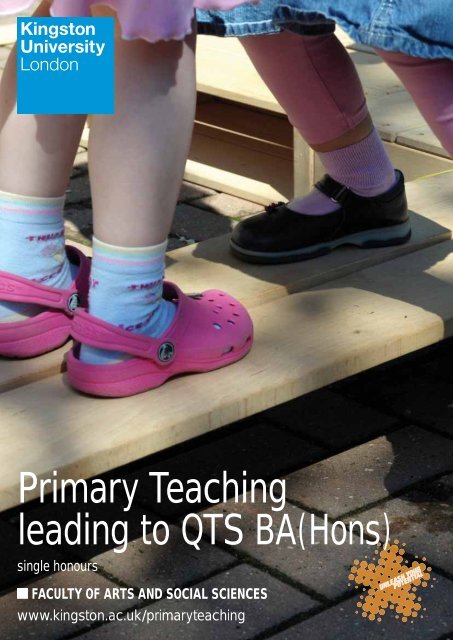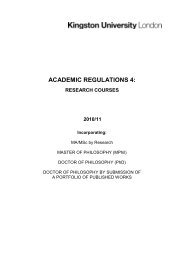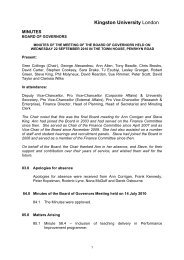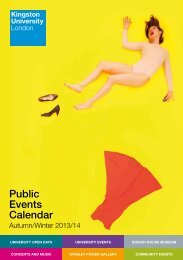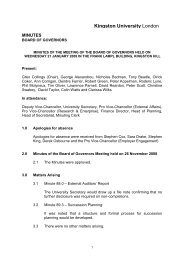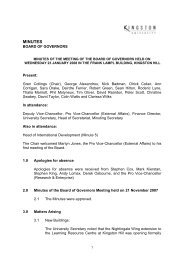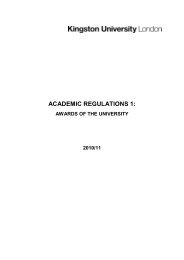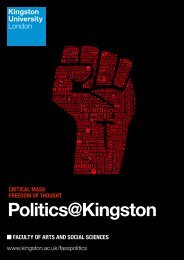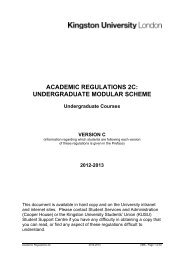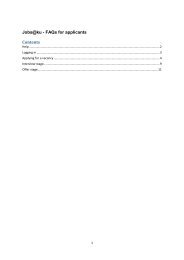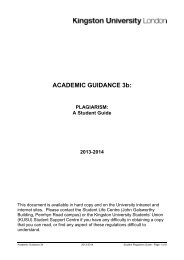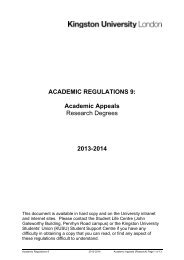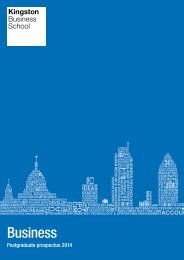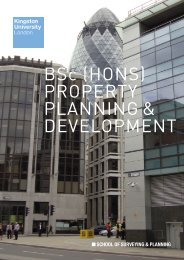Download a PDF course leaflet - Kingston University
Download a PDF course leaflet - Kingston University
Download a PDF course leaflet - Kingston University
Create successful ePaper yourself
Turn your PDF publications into a flip-book with our unique Google optimized e-Paper software.
Primary Teaching<br />
leading to QTS BA(Hons)<br />
single honours<br />
FACULTY OF ARTS AND SOCIAL SCIENCES<br />
www.kingston.ac.uk/primaryteaching
Primary Teaching leading to QTS BA(Hons)<br />
single honours<br />
Our programme<br />
This three-year, full-time <strong>course</strong> will equip you for the complex role of a<br />
primary school teacher working in a fast-changing and stimulating<br />
professional environment. You will have the opportunity to develop your<br />
expertise in a specialist subject in Years 1, 2 and 3.<br />
School experience in our excellent range of partnership schools is an integral<br />
part of the curriculum.<br />
During your Primary Teaching degree you will:<br />
• become fully versed in the core primary curriculum subjects of English,<br />
maths, science and IT, as well as curriculum in the arts, humanities, physical<br />
education and primary languages;<br />
• develop expertise in your specialist subject; and<br />
• learn the techniques that will help you to inspire and enthuse children.<br />
As there are many subjects covered in primary teaching, classes are mostly<br />
in smaller groups of around 25. This ensures that you receive your tutor’s<br />
individual attention and can discuss any issues as they arise. You will<br />
frequently work with two or three other students, preparing something to<br />
present at the subject’s next seminar. The practical, interactive classes make<br />
learning fun, interesting and easier. You’re not only hearing different views,<br />
but also taking part and discussing how to apply what’s being taught. Your<br />
subject specialism is likely to be enhanced by a number of trips, which will<br />
help to bring the subject to life and enable you to study it in context.<br />
School placements<br />
School placements are a major part of the <strong>course</strong>, comprising seven weeks in<br />
Year 1, eight weeks in Year 2 and 10 weeks in your fi nal year. This gives you the<br />
chance to gain real, on-the-job training under supervision.<br />
The School of Education works in partnership with a wide range of primary<br />
schools, taking a leading role in the training of a new generation of teachers.<br />
This means that:<br />
• placement opportunities can arise from a pool of hundreds of schools;<br />
• you are likely to have a choice of placement locations and experience different<br />
schools, helping you make more-informed career choices; and<br />
• employers recognise the calibre of <strong>Kingston</strong> Primary Teaching graduates.<br />
In addition to partner schools throughout Surrey and Greater London, we are<br />
also developing relationships with schools overseas. So, as well as European<br />
exchange opportunities, you will also have the chance to do life-enhancing short<br />
exchanges with partner schools in India and Africa for example.<br />
Centre for Academic Skills and Employability<br />
(CASE)<br />
CASE offers students from the Faculty of Arts and Social Sciences one-toone<br />
help with their studies. We help both undergraduate and postgraduate<br />
students with:<br />
• researching and presenting;<br />
• structuring and editing traditional academic writing;<br />
• structuring and editing multimedia texts; and<br />
• referencing.<br />
CASE also provides a range of resources to enhance employability,<br />
including help with writing CVs, application forms and preparing you for<br />
interviews. Results show that students who use the centre are signifi cantly<br />
more likely to complete their degree. As they are better equipped to act on<br />
feedback, they also tend to do better in their studies.<br />
Learning from the experts<br />
As well as being taught by the School’s enthusiastic, well-qualifi ed and<br />
experienced staff, you will also attend pedagogic classes (learning teaching<br />
skills) that involve outside speakers such as heads, deputies and subject and<br />
special needs co-ordinators. For instance, when a new educational initiative<br />
is launched, guest speakers from schools will come to the campus to explain<br />
how it is being implemented. These lectures usually include a question-andanswer<br />
session, so you can fi nd out everything you want to know about the<br />
subject being discussed and how things are being done in schools. This<br />
provides a good grounding for educational management roles.<br />
Additional academic support<br />
Whatever diffi culties you face, there is support available to help you reach<br />
your full potential. We have a study skills co-ordinator whose role is to provide<br />
additional tuition in English and Maths. This service is available to anyone who<br />
wishes to improve their ability in either of these fi elds. It provides an invaluable<br />
safety net for anyone who fears they may lag behind in these crucial primary<br />
teaching subjects.<br />
You will also use StudySpace, which is a web-based learning management<br />
system that provides access to a host of information and material to assist<br />
with your studies – resources vary from module to module. Other useful<br />
features include online discussion forums (bulletin boards), a virtual classroom<br />
and, when appropriate, a drop-box for online submission of <strong>course</strong>work.<br />
Careers<br />
The employment record of our BA(Hons) graduates is high. Many students<br />
gain positions at our partner schools and report that their <strong>Kingston</strong> training<br />
provided them with an excellent start to their career. Former trainees have<br />
become subject co-ordinators, deputy heads, head teachers and members<br />
of advisory and inspection teams.<br />
Why study teaching at <strong>Kingston</strong> <strong>University</strong>?<br />
• This is a relevant, thought-provoking and enjoyable <strong>course</strong> provided in<br />
partnership with schools.<br />
• The School of Education is rated among the top education<br />
departments in the country, with the Guardian university league table<br />
ranking the School in the top fi ve in the United Kingdom for the last<br />
four years.<br />
• You will gain specialist subject expertise along with training in all core<br />
areas of the primary curriculum.<br />
• Stimulating fi eldwork is included in many subject specialisms.<br />
• Professional accreditation is awarded alongside an academic<br />
qualifi cation.<br />
• Our many contacts with schools provide ample placement<br />
opportunities. You may also have the opportunity to carry out a<br />
placement in a partner school in Europe, India, Nepal or Africa.<br />
• Personal tutors and a strong educational support system ensure you<br />
can get all the help you need to reach your full potential.<br />
„<br />
Want to know more?<br />
www.kingston.ac.uk/<br />
primaryteaching
What you will study<br />
You will study the core elements of the National Curriculum, ICT and the wider curriculum,<br />
together with your chosen subject specialism. Pedagogy – the art of teaching – underpins<br />
the degree, giving you opportunities to develop a full range of professional skills. The skills<br />
you gain will be applied on school experience in each year of the programme, leading to<br />
qualifi cation across the full primary phase (5–11 years of age).<br />
Year 1<br />
• Core Subjects: English, Maths, Science, ICT, The<br />
Arts, Humanities, Languages and Culture<br />
• School Experience<br />
• Professional Studies<br />
Year 2<br />
• As Year 1, but with a subject specialism and a<br />
longer school experience, with options in The<br />
Arts, Humanities and Languages and Culture.<br />
Year 3<br />
• As Year 2, with the subject specialism continued<br />
and a 10-week school experience.<br />
Subject specialisms<br />
You can choose to specialise in English,<br />
Geography and History, Mathematics or Science.<br />
Each specialism involves two strands:<br />
• The fi rst strand builds your academic knowledge<br />
of your specialism within primary schools,<br />
developing skills and techniques to enthuse<br />
children.<br />
• The second looks at the role of your specialism.<br />
You’ll be well prepared to become a teacher and<br />
potentially a subject leader in your chosen fi eld.<br />
The subject specialism takes approximately a fi fth<br />
of your total degree study time. Most specialist<br />
subjects involve a number of trips and excursions.<br />
These deepen your understanding and enhance<br />
what is being taught. They also help you develop<br />
the skills you need to organise school outings.<br />
English<br />
Choosing English as your subject specialism<br />
will give you the opportunity to study a range of<br />
contemporary and classic adult and children’s<br />
literature. In addition, you will explore the<br />
pedagogical implications of this enhanced subject<br />
knowledge and engage with the use of drama, the<br />
moving image and ICT in the classroom context. The<br />
<strong>course</strong> will also enable you to examine how children<br />
acquire language and literacy and discuss key<br />
theories of language in education. All three modules<br />
are closely interrelated. Following on from reading<br />
a wide range of literature, you will also analyse your<br />
own skills as a writer and relate this to the teaching<br />
of writing by creating your own short story, which is<br />
shared with children in the classroom.<br />
Theatre visits play a key part in your study of classic<br />
and contemporary adult and children’s literature, and<br />
students are encouraged to engage with productions<br />
and workshops at the Rose Theatre in <strong>Kingston</strong><br />
www.rosetheatrekingston.org, which has strong<br />
links with the <strong>University</strong>. Students are also invited<br />
to play an active role in the author workshops and<br />
events that form part of degree <strong>course</strong>s taught in<br />
the <strong>University</strong>’s main campus at Penrhyn Road.<br />
Geography and History<br />
Geography and history are closely connected<br />
subjects in the primary curriculum.<br />
Geography explores a variety of themes and places<br />
within local, national and international contexts. You<br />
will study key elements in the primary geography<br />
curriculum and how geography contributes to a<br />
wider primary curriculum, particularly in literacy,<br />
numeracy and history. Cross-curricular themes of<br />
citizenship and sustainability also feature in your<br />
studies. You will use your knowledge of geographical<br />
skills, such as mapping and fi eldwork techniques, to<br />
consider various approaches to teaching geography.<br />
Fieldwork plays an integral part, and you will<br />
take part in study visits to a variety of locations.<br />
These give you the chance to study geographical<br />
features and plan how you would manage a class<br />
excursion to the locations. In addition, the <strong>course</strong><br />
normally incorporates two residential study visits.<br />
During the fi rst year there is a joint Geography–History<br />
visit to a UK location such as Dorset, Yorkshire<br />
or Devon, where you will spend time studying the<br />
geography of the coast and the geography and<br />
history of settlements such as seaside resorts. In the<br />
second year, studies of the European dimension are<br />
enhanced by a study visit to a major European city<br />
such as Amsterdam, Barcelona or Berlin.<br />
History encourages pupils to become deductive,<br />
imaginative and perceptive. Like geography, it allows<br />
us to explore the diversity of human experience.<br />
This <strong>course</strong> offers in-depth opportunities to critically<br />
evaluate the design and management of history<br />
teaching and learning. You will study topics directly<br />
related to the primary curriculum, such as:<br />
• the Romans;<br />
• Britain and the wider world in Tudor times; and<br />
• Victorian Britain.<br />
We use museums and active learning at historic<br />
sites as part of an ‘investigative’ approach to<br />
learning. You will also explore the roles of story,<br />
role-play and sources such as fi lm and portraits in<br />
enriching representations of the past.<br />
History daytrips take advantage of local amenities<br />
such as Hampton Court Palace and the wealth of<br />
museums near the <strong>University</strong>. On these trips, you will<br />
discover more about our history and consider how<br />
you would organise school trips to such locations.<br />
You will also have the opportunity to select an area<br />
of interest in geography and/or history in which to<br />
undertake more in-depth research.<br />
Mathematics<br />
Specialist teachers of mathematics have an<br />
important role in primary schools, and this <strong>course</strong><br />
provides the underpinning knowledge. You will<br />
promote your understanding of mathematics, and<br />
will develop the knowledge, skills and understanding<br />
to teach children mathematics creatively and<br />
confi dently. You will study mathematics in depth<br />
to be able to deliver the full range of the primary<br />
mathematics curriculum from Reception to year 6,<br />
covering aspects such as:<br />
• using and applying mathematics;<br />
• counting and understanding numbers;<br />
• knowing and using number facts;<br />
• calculating;<br />
• understanding shape;<br />
• measuring; and<br />
• handling data.<br />
The focus for each year is as follows:<br />
• Year 1– Developing the progression of<br />
mathematics from FS into secondary topics.<br />
There is a particular focus on Ma1 (including in<br />
the real world) and pedagogy.<br />
• Year 2 – The history of mathematics and its<br />
relevance to the mathematics we teach children<br />
today; maths in the real world; and developing<br />
thinking in mathematics.<br />
• Year 3 – The management of mathematics<br />
(preparation for a co-ordinator role) and the<br />
dissertation.<br />
Organised trips to museums and places of interest<br />
enhance the importance of mathematics in the<br />
real world, and highlight possibilities for school<br />
trips in the future.<br />
Science<br />
This specialism covers physics, chemistry and<br />
biology, plus how to manage the curriculum.<br />
You’ll consider effective teaching approaches and<br />
engage in a variety of techniques to develop your<br />
confi dence, including:<br />
• practical sessions;<br />
• presentations;<br />
• group discussions;<br />
• examination of children’s work; and<br />
• directed self-study.<br />
Science also contributes to wider aspects of the<br />
curriculum, such as citizenship and environmental<br />
education, so you will develop an interactive<br />
teaching approach that links in to the wider<br />
themes characterising primary education.<br />
Visits and fi eldwork are an important part of the<br />
<strong>course</strong>. They aim to deepen your understanding<br />
of and interest in science by providing a stimulating<br />
context for study. Educational visits will be made to<br />
local sites; for example, RHS Wisley and the Science<br />
Museum. As well as discovering more about your<br />
specialist subject, you will think about how to<br />
organise a school trip to the location and engage<br />
a class in the topic.
What our students say<br />
Name: Paul Ryan<br />
Course: BA(Hons) Primary Teaching leading to<br />
Qualifi ed Teacher Status (subject specialism English)<br />
“If anyone had asked me at school if I would ever<br />
become a teacher, I would have said ‘defi nitely<br />
not’. It certainly took a few years for me to arrive<br />
at the stage where I decided that I wanted to<br />
embark on an ITT <strong>course</strong>.<br />
“After my A-Levels I needed a break and some<br />
time to think, so I went down another career<br />
route but I felt I had more to offer. I wanted to do<br />
something where reward was inherent in what I<br />
was doing, rather than just in the pay cheque.<br />
“I had memories of the kind of fulfi lment I was<br />
after from some work with children I had done in<br />
the past, and those memories, combined with an<br />
interest in education and learning that I had never<br />
really explored, led me to apply for this <strong>course</strong>.<br />
“I chose English as my specialism because I<br />
felt speaking, listening, reading and writing are<br />
fundamental to children’s development and are<br />
a way of stimulating imagination and creativity.<br />
“I have found that <strong>Kingston</strong> has hardworking<br />
lecturers who care deeply about what they are<br />
doing. There’s plenty of opportunity for group<br />
work, which makes a sociable, collaborative style<br />
of learning that I would like to promote in my own<br />
teaching. Some of the lectures have been really<br />
interactive and stimulating, and I fi nd that what the<br />
lecturers do in their teaching has an effect on mine.<br />
“The School of Education provides all students on<br />
the <strong>course</strong> with a tutor who is there to help with<br />
any problems. Meetings can be arranged and<br />
I have found my tutors to be incredibly helpful<br />
when I have approached them with some of the<br />
stresses I have encountered.<br />
“One of the most interesting classes was a Special<br />
Educational Needs (SEN) research project. It was<br />
already a subject where I held a particular interest.<br />
I have also particularly enjoyed my specialism<br />
classes, which have given me a valuable insight<br />
into exciting methods of helping children engage<br />
with classic texts that could be considered to be<br />
inaccessible.<br />
“Last year’s placement was very informative.<br />
I was fortunate enough to have the opportunity<br />
to work with an excellent teacher who had a<br />
really good relationship with her class. I learnt<br />
a great deal about behaviour management and<br />
teaching in general. This year’s fi rst week of school<br />
experience, which I have just fi nished, has been<br />
particularly positive, and enjoyable as well.<br />
“I think the most valuable thing about this <strong>course</strong><br />
is the real feeling that I am building my knowledge<br />
and developing my thinking.”<br />
“Our emphasis on teaching subjects<br />
relevant to the world today, and producing<br />
graduates able to make a positive<br />
contribution to that world, makes the<br />
educational experience on offer in our<br />
Faculty at <strong>Kingston</strong> unique among<br />
universities in the United Kingdom.”<br />
Professor Martin McQuillan<br />
Dean of Faculty of Arts and Social Sciences<br />
Top-class reputation<br />
<strong>Kingston</strong> <strong>University</strong> has provided <strong>course</strong>s in<br />
initial teacher training for over 100 years, and has<br />
developed an excellent reputation over this time.<br />
• The School of Education is rated among the top<br />
education departments in the country.<br />
• The Guardian university league table 2011<br />
ranked the School as third in the United<br />
Kingdom.<br />
• The National Student Survey, which monitors<br />
satisfaction with university <strong>course</strong>s, has led<br />
to the School being rated highly in the United<br />
Kingdom for the quality of its BA(Hons) in<br />
Primary Teaching.<br />
• The School of Education is also approved by the<br />
Training Agency for Schools.<br />
• The School is regarded by Ofsted (the government<br />
agency that monitors teaching standards in<br />
education) as a high-quality training provider<br />
across its primary and secondary <strong>course</strong>s.<br />
Entry requirements<br />
Typical offer<br />
• Points: 240<br />
• Units: to include two A-levels or equivalent with a<br />
minimum of 100 points in your subject specialism<br />
if applying for English or 80 points if applying for<br />
Geography/History, Maths or Science.<br />
• Plus GCSE (A–C): fi ve subjects, to include<br />
English Language, Mathematics and Science.<br />
If applying for the Geography and History<br />
specialism, you also need to have a minimum<br />
GCSE grade C in Geography or History.<br />
• Key Skills are not accepted as a substitute for<br />
GCSE grades.<br />
• CACHE Diploma is not accepted unless an<br />
A-level in one of the subject specialisms is also<br />
obtained and the 240 points requirement is met.<br />
• Experience of the primary school environment<br />
is also essential.<br />
Further requirements for combinations<br />
Please see the <strong>course</strong> webpage for details.<br />
International students<br />
All non-UK applicants must meet our English<br />
language requirements. For this <strong>course</strong> it is IELTS<br />
of 6.5 overall, with special conditions for students<br />
who require a Tier-4 student visa. Please make sure<br />
you read our full guidance about English language<br />
requirements on our <strong>course</strong> webpage, which<br />
includes details of other qualifi cations we’ll consider.<br />
Other entry routes<br />
Applications from students with alternative<br />
qualifi cations are welcome and will be considered<br />
on individual merit.<br />
UCAS codes<br />
XQD3 – 3yrs FT English (5–11 years)<br />
XF1V – 3yrs FT Geography & History (5–11 years)<br />
XC11 – 3yrs FT Science (5–11 years)<br />
XG11 – 3yrs FT Mathematics (5–11 years)<br />
Open days<br />
The <strong>University</strong> runs several open days throughout<br />
the year. Staff from the School of Education are<br />
present at these events to answer your questions<br />
about the best route into teacher training for you.<br />
www.kingston.ac.uk/opendays<br />
The School of Education also hosts a number of<br />
Open Sessions. Visit www.kingston.ac.uk/fass/<br />
schools/education/open for more information.<br />
Contact details<br />
Course enquiries<br />
School of Education<br />
<strong>Kingston</strong> <strong>University</strong><br />
<strong>Kingston</strong> Hill<br />
<strong>Kingston</strong> upon Thames<br />
Surrey KT2 7LB<br />
T: +44 (0)20 8417 5145<br />
E: education-admissions@kingston.ac.uk<br />
Accommodation<br />
T: +44 (0)20 8417 3829<br />
E: accommodation@kingston.ac.uk<br />
www.kingston.ac.uk/accommodation<br />
Student Funding Service<br />
T: +44 (0)20 8417 3560<br />
www.kingston.ac.uk/studentfunding<br />
Disability and Dyslexia Support Services<br />
T: +44 (0)20 8417 4284/4252<br />
Minicom: +44 (0)20 8417 4447<br />
F: +44 (0)20 8417 4443<br />
www.kingston.ac.uk/disability-and-dyslexia<br />
International Office<br />
T: +44 (0)20 8417 3411<br />
www.kingston.ac.uk/international<br />
HS(11.222)L<br />
T: +44 (0)8448 552 177 E: aps@kingston.ac.uk www.kingston.ac.uk


